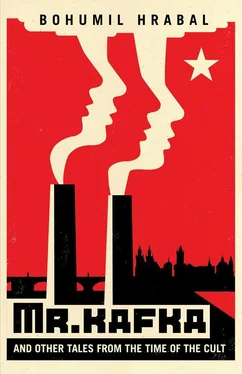“But this is Kladno!” the Dairyman thundered. “We’re totally within our rights! We all work here — defeated classes, communists — we’re doing all this so we’ll all be better off!”
“I wouldn’t be so sure about that,” said the Cop. “Before they tossed me off the force, we operated on the Dual Punch Theory. That is, it always depends on who hits who. If a worker slugs a prosecutor, they can lock the prosecutor up because the presumption is he provoked the worker into doing it. But if a prosecutor slugs a worker, even if the worker was asking for it, they’ll throw the book at the prosecutor because…”
“All well and good,” shouted the Dairyman, “but you can’t get away with that in Kladno! You just can’t!” The overhead crane was approaching, its chains clanking.
“Yes,” said the Judge. His trouser leg had now split open to the knee. He took off his shoe and shook the rest of the cloth loose, as if he were removing his underwear. He looked at the scrap pile where the female convicts were loading another hopper with iron coffin lids. They brought over cast-iron angels with corroded wings and faces — angels splattered with blobs of scorched clay — and tossed them all into the hoppers.
Vindy held the control pendant hanging from the traveling hoist in his hands. He walked along the planks behind the moving basket filled with the slabs of steel and held forth: “The thoughts of Itzak Mauthner, sitting at the comptoir in his central office in Náchod: In the spring of 1830, an Ashkenazi Jew from Halič named Mauthner came to Náchod and declared, That house over there will be mine. In 1832, Mauthner the homeowner declared, That factory over there will be mine. In 1839, Mauthner the manufacturer said, I have five knitting mills and I wish to own nine. And thus the firm of Mauthner’s Knitting Mills came into being, a concern belonging to an industrial overlord with no family escutcheon and no traditions, a magnate who, when he bequeathed his industrial kingdom to his sons, had no idea his sons would shroud themselves in the anonymity of a publicly traded company and that the sons of those sons would become press barons.”
Vindy pressed a button, and the crane came to a halt above a freight car on the tracks. A string of silver saliva emerged from his mouth, which he wiped on his spittle-soaked sleeve.
“It’s as easy as pie,” said the Judge.
His shoe began to open up like a water lily.
The crane operator moved through the flickering bars of golden sunlight and into the tunnel of shadows. At the far end of the long factory hall, the crane had seemed tiny but it drew nearer like an aircraft with broad wings and came to rest above the yard engine and the group of grinders. In the gondola, a man in a black-cotton smock — the manager — stood up, planted his white hands on the gondola railing, leaned over, and with a golden sash of sunlight across his chest, spoke as if from a cathedral pulpit.
“Honor to work!” he said, using the official party greeting.
“I’ll honor work if the pay’s decent,” retorted the Dairyman.
“So, comrades, we have a plan, and we have to get on with it,” the manager said, stabbing downward with his finger. “Otherwise I’ll have no recourse but to report you to the union council.”
“Who ordered the higher quotas? Who consulted with whom?” asked the Dairyman.
“The Ministry of Heavy Industry.”
“At whose suggestion?”
“At… at our suggestion.”
“There, you see, the fox is in the henhouse! And the ones you should have consulted first you never consulted at all. What are we, just a bunch of statistics?”
“No, I was merely executing a trade-union decision. Now, are you going to get back to work?”
“No, we’re not. Only if you personally put it up on the board that we’re operating under the old quotas until we get a firm agreement, negotiated as per regulations.”
“Right, then,” said the manager, raising his black sleeve till it was immersed to the elbow in a shaft of golden sunlight. “But I’m reporting this to the director’s office and to the trade union.”
“Why are you treating us like this?” shouted the grinder with the cruciform scar under his eye. “Why are you taking a day’s wages out of my pocket?”
“Václav!” said the manager. “I hardly know you any more. You’re an old comrade and you’re coming after me like that?”
“You’re making my life miserable!” the grinder shouted, and he picked up a crowbar, tossed it from hand to hand, scattering little reflections of sunlight around the shop, then hurled it at a stack of cast-iron slabs. The crowbar clanged and clattered to the ground, the echo of its voice dying away among the blue shadows. The grinder ran on to the stack, climbed over the slabs, quivering with rage, and stood there, sliced in two by a band of sunlight.
“But Václav, I’m one of you, I’m a worker too, you know that,” the manager said, placing his hand over his heart.
“Then you should understand what this is about,” said Václav, and he walked to the opposite side of the shop; the gate groaned open, then slammed shut.
The manager threw up his arms and nodded at the operator, who pushed a button, and the crane moved back through the factory hall carrying the manager away in the gondola, his back to the men, while the sun pouring through the ventilation louvers whipped his black cotton smock with golden scourges.
The vapors rising from the pickling vat were unbelievably beautiful and dense. The Judge couldn’t resist. He walked quickly across the plank and thrust his arm into the cloud up to his elbow.
The female prisoner squatted down on the scrap pile, cradling her wounded arm in her lap like a plaster doll and, with her good arm, she picked up an angel — the kind that used to decorate horse-drawn hearses or aristocratic gravesites — and she carried it to the hoppers.
Vindy handed the control pendant to the Judge and indicated its proper use. “Your honor,” he said, “we use this button to raise the load, and this one to lower it. This button is for moving the load forward, and this one is for moving it back. We can’t afford to get them mixed up, so let’s try again. Yesterday, I wrote a poem called ‘Ministerial Night: In Which the Departmental Head Has a Vision of Tantalus at Five Minutes to Midnight.’”
“Thank you,” said the Judge, and took over the controls.
“Or,” Vindy asked, “would you rather hear my poem called ‘How the Miner’s Daughter Forgot Her Proletarian Origins and Succumbed to the Temptations of Eros?” But then he caught himself. “Oh God, I’m always going on about myself. How are you doing, your honor?”
The Judge pushed a button, but it was the wrong one. “Stop! Stop!” Vindy shouted.
The Sergeant Major took a piece of chalk and wrote the number twenty-two on the gate, followed by twenty-eight, drew a line under them, wrote down the difference, and underlined it twice. Then, tapping the chalk on the result — six — he turned to his listeners and said, “They want us to crank through an extra six hundredweight a day! But what if each ingot needs a complete grinding!”
At that moment the gate slid open, and the Sergeant Major, still facing his listeners, tapped his chalk on the forehead of the man who’d just opened it.
“There’s a film crew here, boys,” said the maintenance man, the chalk still poised on his forehead. “They’re looking for workers to have a discussion about current events.”
“Well, in that case, let’s go,” said the Dairyman, and, with the other grinders, he walked out into the sunlight where a van was parked. Some of the film crew were unloading buckets of whitewash. The young director pointed to a wagon loaded with ingots, and the cameraman carried his camera across the rails.
Читать дальше












